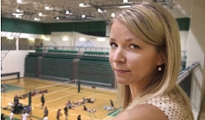
Making Sports a Positive Experience
Dr. Leah Ferguson, an assistant professor in the College of Kinesiology, is passionate about opening the conversations surrounding how an athlete's mental image of themselves can impact their performance, especially for young women. Her research background encompasses many key points but her current focus includes exploring the benefits of self compassion and working with Aboriginal youth.
For more information about Leah's current projects and her research, please read this recent feature from the Saskatoon StarPhoenix's Bridges publication, excerpted below.
____________________
Making Sports a Positive Experience
by Scott Larson, Saskatoon StarPhoenix
Leah Ferguson grew up as a competitive dancer, so she knows about the benefits athletics can offer.
“There are the different skills that are developed, the leadership skills and discipline and willpower — all those great things,” says Ferguson, an assistant professor in the College of Kinesiology at the University of Saskatchewan.
“But it also has a potential dark side to it,” she says.
That’s especially true for young women who face challenges in sport that their male counterparts don’t.
“It can be very different for men and women,” Ferguson said. “That’s not to say men athletes don’t have challenges because they certainly do.
Research has shown women athletes are conflicted with body-related demands such as needing to look a certain way for specific sports to perform at peak levels.
“And that may look very different than the societal ideal,” she said. “And how do they manage that physically, emotionally and mentally?”
She has seen both sides, and it has led to several projects that focus on young women and aboriginal athletes.
“I started to go into research because at the time I was teaching dance and I was heartbroken by these young girls — five, six, seven years old — who would look at each other’s bellies and say, ‘She has a belly!’
“They had no filter,” said Ferguson. “You’d try to make it a teachable moment and say that everyone comes in different shapes and sizes and let’s be healthy and move together and learn new skills.”
One of her projects is research on women athletes, nationally funded through the Social Sciences and Humanities Research Council of Canada.
Working with young women athletes 16 to 25 years old, the research will focus on their psychological well-being and a concept called self compassion.
Ferguson said self compassion has been a buzzword in psychology for the past 10 years or so.
“It’s taking off in general psychology, and we are trying to bring it into the sports psychology realm,” she said.
“The purpose of the research is to investigate the stability of self-compassion in sport and its relationship with sport-specific and well-being outcomes among young women athletes throughout a competitive season.”
Sometimes being self compassionate is at odds with how athletes think they must behave in order to achieve their best results.
“If I sit down and have a conversation with athletes, they see the benefit to it — ‘I don’t have to beat myself up. Why am I so hard on myself? Why aren’t I nicer to myself?’
“But then they have the flip side of saying, ‘I have to be hard on myself to meet my goals, I can’t let myself off the hook. I need to push myself.’
“So there is this conflict they have where on the one hand they see it as a potential benefit but they are hesitant to embrace it.”
The provincewide study will track about 300 competitive women athletes from a variety of sports over their seasons. (FULL STORY)
Photo credit: Gord Waldner, Saskatoon Star Phoenix
